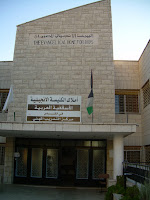 After breakfast at St. George’s, Jean and I walked back into the Old City to worship at ?Lutheran Church of the Redeemer. The Church was built for 19th century German ?pilgrims visiting the Holy Land. There are two congregations, one in Arabic, and the ?other in English. There is something compelling about worship in Jerusalem. It is like ?seeing a baseball game at Wrigley Field. It just feels different. The text from Luke 10 ?talked about Jesus sending out the 70 disciples.
After breakfast at St. George’s, Jean and I walked back into the Old City to worship at ?Lutheran Church of the Redeemer. The Church was built for 19th century German ?pilgrims visiting the Holy Land. There are two congregations, one in Arabic, and the ?other in English. There is something compelling about worship in Jerusalem. It is like ?seeing a baseball game at Wrigley Field. It just feels different. The text from Luke 10 ?talked about Jesus sending out the 70 disciples.
?“See, I am sending you out like lambs into the midst of wolves” says Jesus. “Carry no ?purse, no bag, no sandals… Whenever you enter a town and its people welcome you, eat ?what is set before you; cure the sick who are there, and say to them, ‘The kingdom of God ?has come near to you.’”
?
Travel tends to make you take risks and accept hospitality, even when you would prefer ?not to. It makes you vulnerable and able to learn new things.
After worship we chatted with members of the English language congregation. This is a ?diverse group from all over the world. Mark Brown works for the Lutheran World ?Federation at Augusta Victoria Hospital. In 1999 I helped produce a ?video about this important Palestinian healthcare facility located on the Mount of Olives. ?Mark invited Jean and me to join him for dinner later in the week. We also ran into Esther ?and John Prabakar. Originally from India, John is a retired physician. Esther has a ?prayer scrapbook ministry. They live in Rochelle, Illinois and are spending six weeks in ?Jerusalem volunteering at Augusta Victoria. Two years ago I produced a video about ?Esther’s prayer ministry. It is a small world.
?
After worship, Jean, Julie and I hauled our luggage over to the bus station. Fifteen Sheckels ?bought us a ride to Ramallah and our work with the Love Thy Neighbor’s Living Nonviolence Peace Camp. ?Ramallah is on the West Bank, just north of Jerusalem. It is headquarters for ?the Palestinian Authority. To get to Ramallah, the bus must navigate around the newly ?constructed concrete separation wall which the Israelis call a “security fence.” This wall is a ?major source of controversy and tension here in the Holy Land. Israel wants to prevent ?terrorists from entering Jewish areas. The Palestinians see the wall as a barrier to peace ?and a land grab on the part of the Jewish state.
?
A trip that should take 15 minutes now takes an hour. At several points along the way, ?Palestinians are stopped by Israeli soldiers, searched and asked to show their I.D’s. The wall, ?soldiers and checkpoints are all on Palestinian land inside the West Bank. It’s not a ?problem if you are only making one or two trips. But for millions of Palestinians who sleep ?in the West Bank and work in Jerusalem, the wall is a crippling economic barrier. Some ?Palestinians see the wall as a new form of Apartheid.
We arrived in Ramallah and hailed a taxi for what should have been a short drive to the ?Evangelical School run by the Anglican Church. An hour later we finally figured out ?where it was, dropped off our luggage and went to meet our team for lunch.
Love Thy Neighbor Peace Camp is led by a young Palestinian-American named Tarek Abuata. ?A Christian, Tarek was born in Bethlehem and moved to Texas at the age of 12. In the ?U.S. he studied international law and has made advocacy for the Palestinian people his ?career and life passion. He has assembled a young, energetic team of Palestinians and ?Americans who have a similar passion. Their mission is to provide educational ?resources and programs about the plight of Palestinians in Palestine/Israel and to support ?their deepening commitment to nonviolence as the way to bring a just peace for ?themselves and their neighbors. ?
Leave a Reply